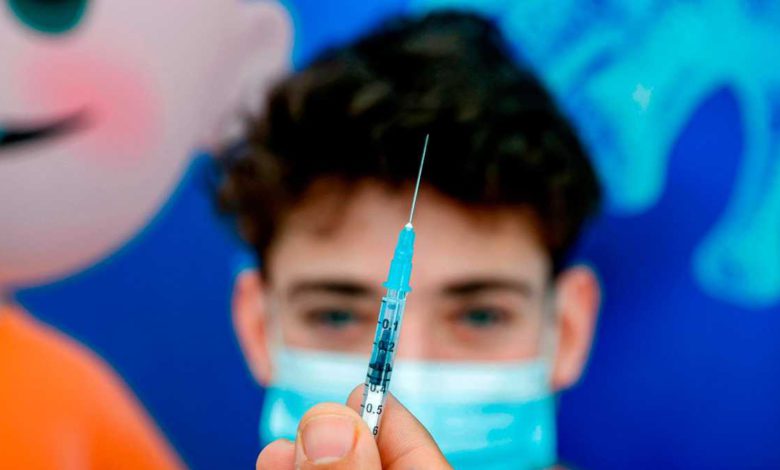

With federal health officials set to consider Pfizer's COVID-19 vaccine for children 5 years and older, most Americans are slated to qualify for a shot soon. But a widening gap between vaccination rates could slow the country's progress in its fight against COVID-19, an expert warned Thursday.For 12-to-17-year-olds, a key demographic that lags other age groups with just 47% fully vaccinated nationwide, many Southern states are trailing even further behind.Alabama, Georgia, Louisiana, Mississippi, South Carolina and Tennessee all have less than a third of eligible adolescents fully vaccinated, according to a CNN analysis, as do North Dakota, West Virginia and Wyoming. And that could pose a greater challenge moving forward, experts warn."Once again you have this geographic divide where parents are holding back on vaccinating their adolescents, and I have to believe they will probably hold back on vaccinating the younger kids as well," Dr. Peter Hotez, dean of the National School of Tropical Medicine at Baylor College of Medicine in Texas, told CNN."So we may be looking at very low uptake of this pediatric vaccine in the South and also in the Mountain West, and that's going to be a problem that's going to slow us down."And as the delta variant continues to be the most common form of the virus in the U.S., unvaccinated children are at significant risk because that strain is more transmissible.The Food and Drug Administration will meet Oct. 26 to discuss Pfizer's application for emergency use authorization for the vaccine in children ages 5 to 11. If the FDA greenlights it, the U.S. Centers for Disease Control and Prevention will have the final sign-off.So far, about one-third of parents of 5- to 11-year-olds say that they will vaccinate their child as soon as a vaccine becomes available for that age group, according to the Kaiser Family Foundation Vaccine Monitor survey published late last month.But more COVID-19 vaccine mandates for children on the state level could be on the horizon once the shots are approved, U.S. Surgeon General Dr. Vivek Murthy said Thursday."I think part of the reason you're going to see more states likely move in that direction post-authorization is because we all want our kids to go back to school, to be able to stay in school and to be safe," Murthy told CNN. "We've lost hundreds of children to COVID. ...Thousands have been hospitalized, and we could prevent a lot of this with a safe and effective vaccine."More than 600 children have died from COVID-19, according to the CDC.Children are especially vulnerable to COVID-19 and the flu this winterAnother vaccination that experts have been urging for children to take is the flu vaccine."Perhaps particularly of concern this season, administration of influenza vaccines with other vaccines is fine, and co-administration of influenza and other COVID-19 vaccines is encouraged," Dr. David Shay, a medical officer with the CDC's National Center for Immunization and Respiratory Diseases said on a CDC Clinician Outreach and Communication Activity call.Clinicians should administer the vaccines in different parts of the body if possible, Shay advised Thursday."The recommendation for this year is that COVID-19 vaccines may be administered without regard to the timing of other vaccines, and that would include simultaneous administration of COVID-19 vaccine and other vaccines on the same day," he said, adding that the CDC is currently monitoring the effects of co-administration of the COVID-19 vaccine."It's actually encouraged if it's useful, and you've got someone who's in the office to get a COVID-19 vaccine, if there is an age-appropriate flu vaccine available, to offer it," he explained.Health experts have been cautioning about the possibility of the double threat flu and coronavirus infections could bring to health care resources that are already strained.But even flu vaccination faces some challenges.About 44% of Americans plan to get a flu shot, according to a new survey from the National Foundation for Infectious Diseases. The survey also found that 37% of adults are very or extremely worried about COVID-19 for themselves or someone in their family, but only 19% said they were worried about flu."Of further concern, the survey found that nearly 1 in 4 (23%) who are at higher risk for flu-related complications said they were not planning to get vaccinated this season," the foundation said in a statement.Vaccine mandates are working, top health official saysThe increase in mandates is working in terms of increasing vaccinations, according to officials.Murthy told CNN on Thursday that health officials are seeing evidence of an uptick."On average, organizations that put vaccine requirements in place are seeing a 20%-plus increase in the percentage of people who are vaccinated," Murthy said.He added that such vaccine requirements aren't new in the U.S., and their goal is to keep the public safe.Currently, 65.8% of people eligible to receive COVID-19 shots are fully vaccinated, CDC data shows.An average of 281,303 people are initiating vaccination each day, according to the CDC.This is a 31.4% increase from last week and a 25% drop from a month earlier.In New York City, Mayor Bill de Blasio said 2,000 additional public school employees received their COVID-19 vaccine after the city's mandate went into effect September 27. In the two weeks before the deadline, there were 20,000 vaccinations, he said."This strategy is working," said de Blasio, adding that all 1,600 public schools are open.
With federal health officials set to consider Pfizer's COVID-19 vaccine for children 5 years and older, most Americans are slated to qualify for a shot soon. But a widening gap between vaccination rates could slow the country's progress in its fight against COVID-19, an expert warned Thursday.
For 12-to-17-year-olds, a key demographic that lags other age groups with just 47% fully vaccinated nationwide, many Southern states are trailing even further behind.
Alabama, Georgia, Louisiana, Mississippi, South Carolina and Tennessee all have less than a third of eligible adolescents fully vaccinated, according to a CNN analysis, as do North Dakota, West Virginia and Wyoming. And that could pose a greater challenge moving forward, experts warn.
"Once again you have this geographic divide where parents are holding back on vaccinating their adolescents, and I have to believe they will probably hold back on vaccinating the younger kids as well," Dr. Peter Hotez, dean of the National School of Tropical Medicine at Baylor College of Medicine in Texas, told CNN.
"So we may be looking at very low uptake of this pediatric vaccine in the South and also in the Mountain West, and that's going to be a problem that's going to slow us down."
And as the delta variant continues to be the most common form of the virus in the U.S., unvaccinated children are at significant risk because that strain is more transmissible.
The Food and Drug Administration will meet Oct. 26 to discuss Pfizer's application for emergency use authorization for the vaccine in children ages 5 to 11. If the FDA greenlights it, the U.S. Centers for Disease Control and Prevention will have the final sign-off.
So far, about one-third of parents of 5- to 11-year-olds say that they will vaccinate their child as soon as a vaccine becomes available for that age group, according to the Kaiser Family Foundation Vaccine Monitor survey published late last month.
But more COVID-19 vaccine mandates for children on the state level could be on the horizon once the shots are approved, U.S. Surgeon General Dr. Vivek Murthy said Thursday.
"I think part of the reason you're going to see more states likely move in that direction post-authorization is because we all want our kids to go back to school, to be able to stay in school and to be safe," Murthy told CNN. "We've lost hundreds of children to COVID. ...Thousands have been hospitalized, and we could prevent a lot of this with a safe and effective vaccine."
More than 600 children have died from COVID-19, according to the CDC.
Children are especially vulnerable to COVID-19 and the flu this winter
Another vaccination that experts have been urging for children to take is the flu vaccine.
"Perhaps particularly of concern this season, administration of influenza vaccines with other vaccines is fine, and co-administration of influenza and other COVID-19 vaccines is encouraged," Dr. David Shay, a medical officer with the CDC's National Center for Immunization and Respiratory Diseases said on a CDC Clinician Outreach and Communication Activity call.
Clinicians should administer the vaccines in different parts of the body if possible, Shay advised Thursday.
"The recommendation for this year is that COVID-19 vaccines may be administered without regard to the timing of other vaccines, and that would include simultaneous administration of COVID-19 vaccine and other vaccines on the same day," he said, adding that the CDC is currently monitoring the effects of co-administration of the COVID-19 vaccine.
"It's actually encouraged if it's useful, and you've got someone who's in the office to get a COVID-19 vaccine, if there is an age-appropriate flu vaccine available, to offer it," he explained.
Health experts have been cautioning about the possibility of the double threat flu and coronavirus infections could bring to health care resources that are already strained.
But even flu vaccination faces some challenges.
About 44% of Americans plan to get a flu shot, according to a new survey from the National Foundation for Infectious Diseases. The survey also found that 37% of adults are very or extremely worried about COVID-19 for themselves or someone in their family, but only 19% said they were worried about flu.
"Of further concern, the survey found that nearly 1 in 4 (23%) who are at higher risk for flu-related complications said they were not planning to get vaccinated this season," the foundation said in a statement.
Vaccine mandates are working, top health official says
The increase in mandates is working in terms of increasing vaccinations, according to officials.
Murthy told CNN on Thursday that health officials are seeing evidence of an uptick.
"On average, organizations that put vaccine requirements in place are seeing a 20%-plus increase in the percentage of people who are vaccinated," Murthy said.
He added that such vaccine requirements aren't new in the U.S., and their goal is to keep the public safe.
Currently, 65.8% of people eligible to receive COVID-19 shots are fully vaccinated, CDC data shows.
An average of 281,303 people are initiating vaccination each day, according to the CDC.
This is a 31.4% increase from last week and a 25% drop from a month earlier.
In New York City, Mayor Bill de Blasio said 2,000 additional public school employees received their COVID-19 vaccine after the city's mandate went into effect September 27. In the two weeks before the deadline, there were 20,000 vaccinations, he said.
"This strategy is working," said de Blasio, adding that all 1,600 public schools are open.
Source link








